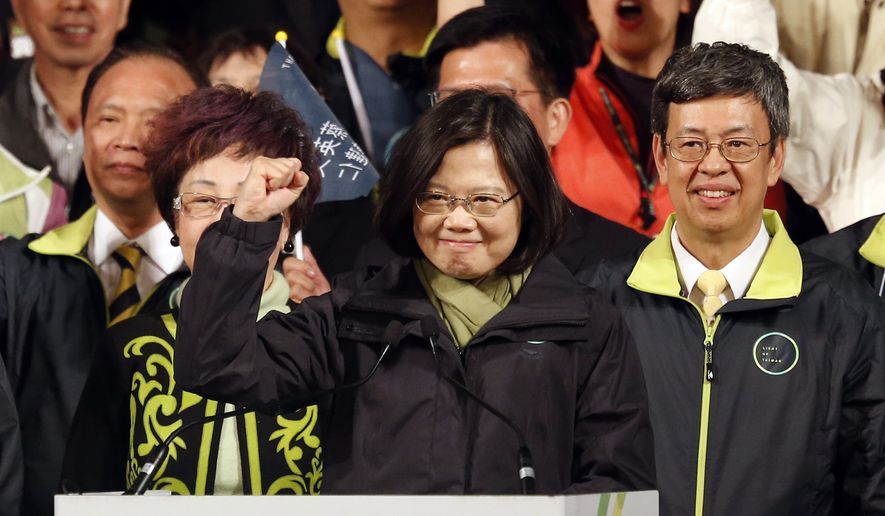Last Saturday voters in Taiwan overwhelmingly elected a Western-educated lawyer named Tsai Ing-wen of the opposition Democratic Progressive Party (DPP) to be the country’s first female president. It was a watershed event in Taiwanese political history, not just for the lopsidedness of the result but, more importantly, for what it said about voter attitudes on an existential issue: the relevance of communist China to the island democracy.
The first tell-tale sign that this would be a referendum on China did not come with the 2016 presidential race. It has become seemingly inevitable since Taiwan’s midterm local elections in November 2014 that whichever political party clung more closely to the increasingly tenuous connection with China was destined to suffer.
In that election, the incumbent Kuomintang, or KMT, got decimated by the independence-leaning DPP. When the ballots were counted, the KMT had lost by a landslide at virtually every level. A major reason for the KMT rout was that then-President Ma Ying-jeou had accelerated his policy of cozying up to Beijing after his 2012 re-election, during which he had vowed to never meet with the Chinese leaders without first consulting Taiwan’s voters. That policy triggered massive student-led protests, dubbed the Sunflower Movement, and increasingly strident opposition from the DPP.
That should have been a warning signal to the KMT leadership that getting close to China was not going to play well with Taiwan’s voters. But the illusion of the KMT as a legitimate political party over the whole of China still lingered despite the fact that the KMT, for the past 70 years, has been, for all practical purposes, a Taiwanese political party.
Despite the agony of the 2014 defeat, the tone-deaf KMT establishment chose an even more pro-unification candidate, Hung Hsiu-chu, for this year’s all-important presidential race. Ms. Hung was an unknown, untested and — according to many — unqualified female legislator whose most pronounced policy position was her unwavering insistence on the KMT’s political connection with mainland China and on the idea that Taiwan remains part of a single, unified China. By contrast, the DPP quickly settled on Ms. Tsai, a lawyer and a Taiwanese, as its candidate.
For a while Taiwan was thrilled to have — for the first time in the history of any Chinese society — two female presidential candidates. But very early in the campaign, it became clear that Ms. Hung was no match for Ms. Tsai, in part because of her lack of energy, but primarily because her stand on unification with China was, for most voters, a major turn-off. Her polling numbers plummeted and the election result looked like a foregone conclusion.
Sensing the inevitability of Ms. Hung’s defeat, the KMT Mandarins staged a coup in October. Four months into the race, she was humiliatingly dropped in October from the ticket, to be replaced by a Taiwan-born moderate politician named Eric Chu.
But it was too late.
The urbane and able Mr. Chu had a heavy cross to bear: Just two months before the vote, President Ma made a secretly planned, high-profile trip to Singapore on Nov. 7 to meet with Chinese President Xi Jinping, the first ever one-on-one meeting between the leaders from the two sides of the Taiwan Strait. For Mr. Ma the meeting was meant to strengthen the KMT’s claim that it alone could bring peace and stability through direct talk with its self-proclaimed master in Beijing, and so boost Mr. Chu’s chances in the election.
But the idea behind the Ma-Xi meeting was problematic for most Taiwanese voters. Mr. Ma’s open support for the so-called “1992 Consensus” — whereby the two sides agree that there is only one China and Taiwan is part of China, but let each side interpret what that “China” is and who represents it — was an implicit recognition of China’s flawed “One Country, Two Systems” approach.
And, under that approach, Beijing exercised sovereignty, defense responsibility and diplomatic representation for the region that included Hong Kong and Taiwan, but allowed the capitalist system or lifestyle to exist within that region. The recent unhappy experience in Hong Kong, however, had severely discredited that approach for many Taiwanese voters.
Mr. Ma miscalculated badly, as his meeting with Mr. Xi only served to isolate the KMT further from the island’s other political forces. The fringe political parties — the “third force” — were outraged. The DPP called the trip the ultimate betrayal of Mr. Ma’s 2011 campaign pledge that he would never meet individually with the leader of communist China during his second term.
The final nail in the coffin of KMT’s defeat came on the day before the election. A terrified 16-year-old Taiwanese singer named Chou Tzuyu was shown on TV issuing a tortured apology to China and its many nationalist Internet flamers for holding a Taiwanese flag in a production screenshot, an act for which she was accused of being a “pro-Taiwan-independence activist.”
The televised apology outraged all segments of the Taiwanese society, further discrediting the KMT’s China-friendly approach and giving the DPP the final push toward a landslide triumph.
And until the KMT recognizes that it is not a Chinese political party but a Taiwanese political party, the streak of electorate defeats will continue.
• Miles Yu’s column appears Fridays. He can be reached at mmilesyu@gmail.com and @Yu_miles.
• Miles Yu can be reached at yu123@washingtontimes.com.




Please read our comment policy before commenting.